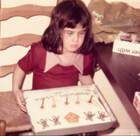 by Laura L. Engel A miracle happened in my life in 2016. I was seventeen when I was sent to a home for unwed mothers where I was pressured into surrendering my newborn son to adoption. For almost fifty years I secretly mourned the loss of that baby. In 2016 my first son discovered me through Ancestry DNA. All those years ago I had been a sad pregnant teenage girl with no support, no options. Now I was a grandmother in her late sixties, but that girl inside of me had lived on and was overjoyed my son had found me. Content Warning- This essay includes references to adoptee suicide.
1 Comment
by Hannah Andrews
The truth is I never thought much about adoption. Oh wait, that’s a lie. It is, in fact, the biggest lie I told others. It wasn’t really intentional. It’s just that it was the lie I told myself, a lie I lived and breathed for almost fifty years.  by Hannah Andrews This month’s theme is “Luck and Adoption,” and it’s sure to spark conversation across our Peer Support Groups. We offer free ZOOM peer support for adopted persons, first parents, adoptive and foster parents, and DNA discoveries. Just send an email to aka@adoption knowledge.org specifying the group you identify with and you’ll receive the ZOOM invites. We have monthly themes, but you’re always welcome to speak on other topics in addition to, or instead of. As for me, here’s my two cents on “Luck and Adoption.” My first thought was UGH. Like many (most?) adoptees I’ve been told ad nauseam how very lucky I was to be adopted. By relatives, friends, total strangers, society, the media, and the entire world. Yet, even though I knew I was “lucky” to have ended up with the good, supportive, loving parents I landed in. Many adoptees do NOT land in safe homes, this should be the least of what we are guaranteed as adoptees–safety and love–I am aware of the privilege fate granted me.  By Ereka Howard According to Dictionary.com, identity is defined as the state or fact of remaining the same one or ones, under varying aspects or conditions. I spent two years in foster care and then was adopted as a toddler. As a child growing up in a predominantly African American family, one reason I struggled with identity was due to not looking like the family that adopted me. When I was younger, I remember looking at my parents and thinking maybe they really were my biological parents and just didn't want to tell me. Maybe a swan brought me in and dropped me off at their door. |
Back to Main BlogNewsletter ArchivesBlog Archive
April 2024
Categories |

 RSS Feed
RSS Feed